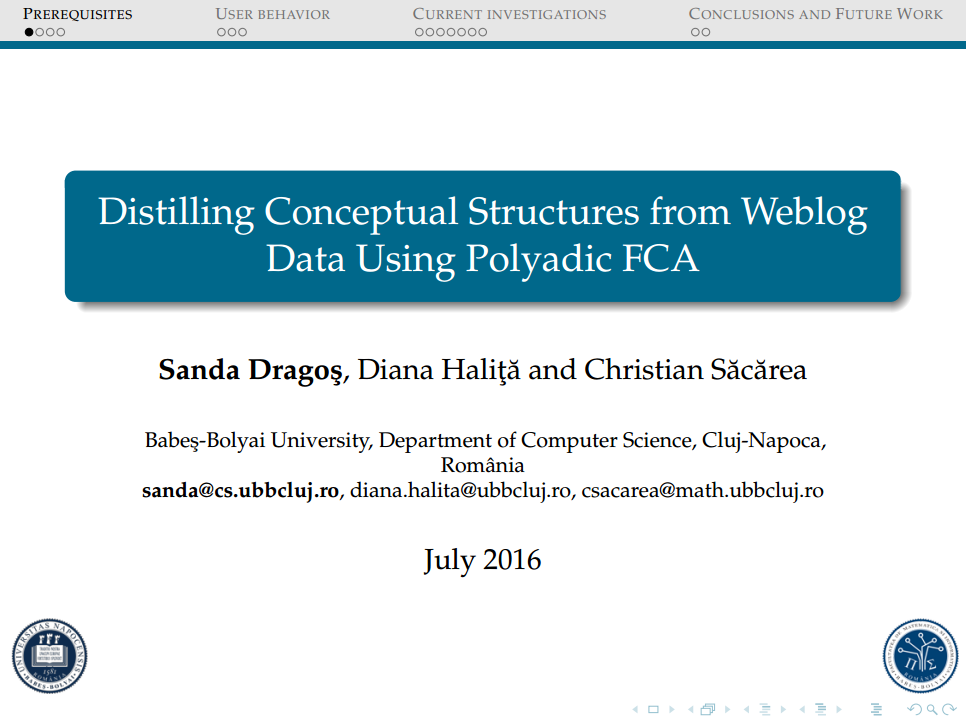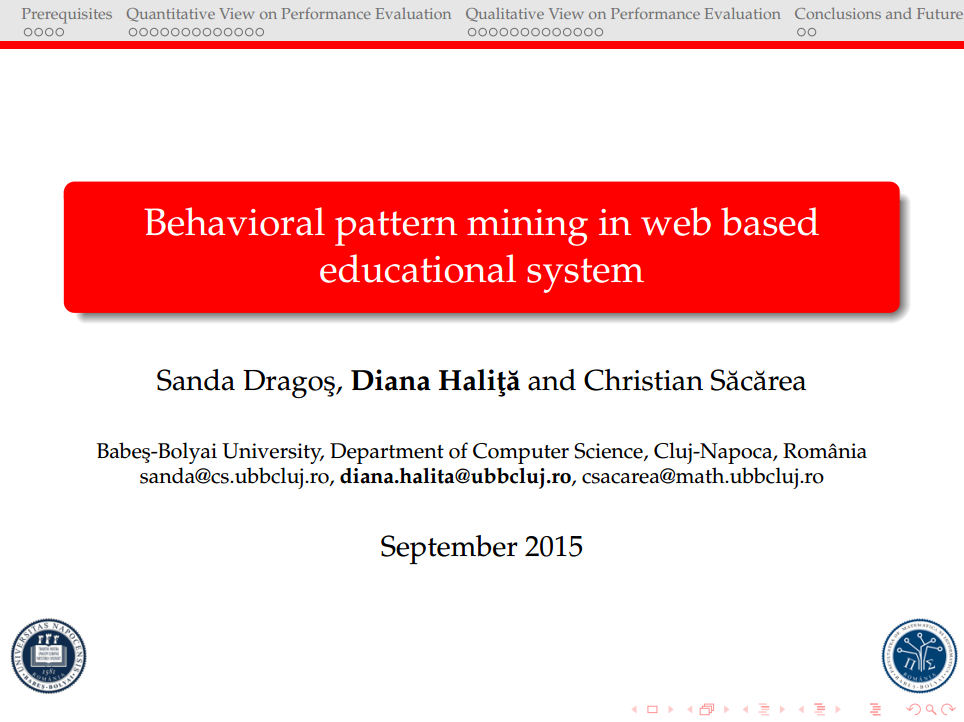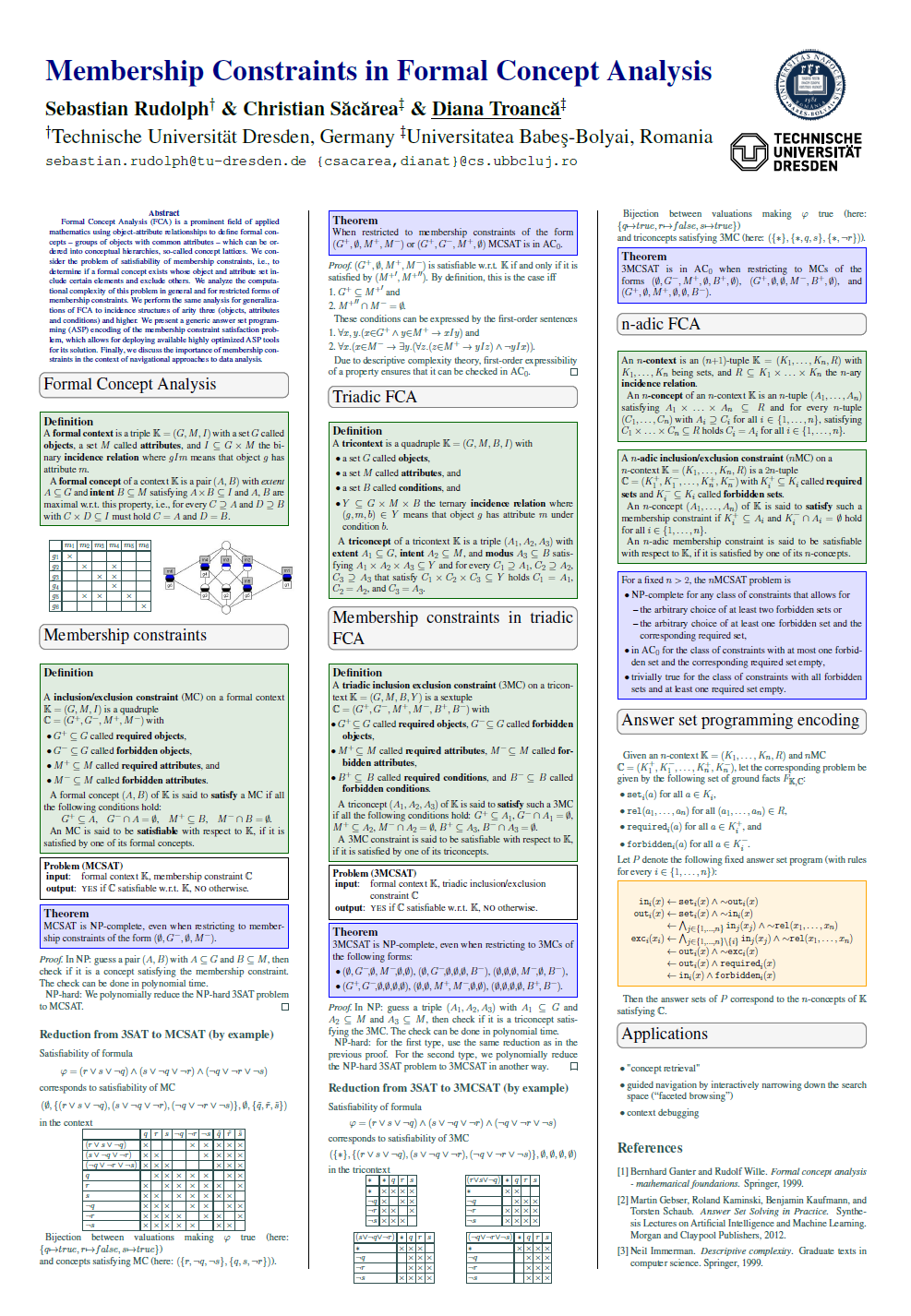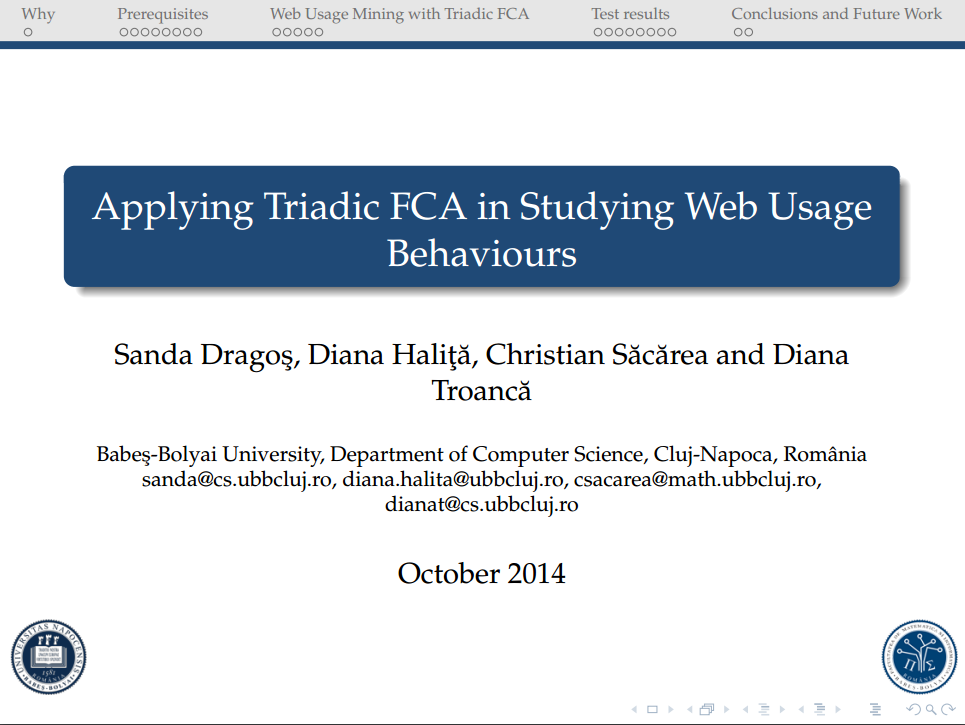Abstract:
Formal Concept Analysis (FCA) is a mathematically inspired field of knowledge representation with wide applications in knowledge discovery and decision support. Polyadic FCA is an extension of classical FCA that instead of a binary uses an n-ary incidence relation to define formal concepts, i.e. data clusters in which all elements are interrelated.
We consider a paradigm for navigating the space of concepts, based on so-called membership constraints. We present an implementation for the cases n ∈ {2, 3, 4} using an encoding into answer set programming (ASP) allowing us to exploit optimization strategies offered by ASP. For the case n = 3, we compare this implementation to a second strategy that uses exhaustive search in the concept set, which is precomputed by an existing tool. We evaluate the implementation strategies in terms of performance. Finally, we discuss the limitations of each approach and the possibility of generalizations to n-ary datasets.
Keywords:
Formal Concept Analysis, Polyadic FCA, navigating the space of concepts, membership constraints, answer set programming
Investigating Trend-setters in E-learning Systems using Polyadic Formal Concept Analysis and Answer Set Programming
Abstract:
Web-based educational systems offer unique opportunities to study how students learn and based on the analysis of the users’ behavior, to develop methods to improve the e-learning system. These opportunities are explored, in the current paper, by blending web usage mining techniques with polyadic formal concept analysis and answer set programming. In this research, we consider the problem of investigating browsing behavior by analyzing users’ behavioral patterns on a locally developed e-learning platform, called PULSE. Moreover, we investigate users’ behavior by using similarity measures of various chains of accessed pages in a tetradic and a pentadic setting. Furthermore, we present in this paper an approach for detecting repetitive behavioral patterns in order to determine trend-setters and followers.
Keywords:
Web-based educational systems, polyadic formal concept analysis, answer set programming, repetitive behavioral patterns
Distilling Conceptual Structures from Weblog Using Polyadic FCA
Abstract:
Formal Concept Analysis (FCA) is a prominent field of applied mathematics which is closely related to knowledge discovery, processing and representation. We consider the problem of distilling relevant conceptual structures from weblog data, more precisely, we investigate users’ behavioral patterns in an web based educational platform by using n-adic FCA (n=3,n=4). We focus in our research on log data gathered from e-learning platforms. Such systems are particularly interesting, since user’s behavioral patterns are closely related to their academic performance. We investigate user’s behavior by using similarity measures of various visited page chains. We exemplify the methods we have developed on a locally developed e-learning platform called PULSE. Data gathered from weblogs have been preprocessed and conceptual landscapes of knowledge have been built using FCA. Triadic FCA (3FCA) is used to investigate correlations between similar page chains and the time granule when a certain pattern occurs. Finally, we employ tetradic FCA (4FCA) to compare web usage patterns wrt. temporal development and occurence. As far as we know, this is the first attempt to use 4FCA in web usage mining.
Keywords:
Web usage mining, Behavioral patterns, Formal Concept Analysis, Similarity measures
Behavioral pattern mining in web based educational system
Abstract:
This paper presents a variety of methods that we have used and published along the years in order to investigate users behavioral patterns within e-learning systems. We have used both quantitative and qualitative methods, each offering a different level of insight. In this paper we would like to present how an investigation can benefit from using all of those methods. We start by using quantitative methods that provide us an overall perspective, from which we can focus on specific segments of data that represent points of interest on which we apply qualitative methods that provide a more detailed perspective. Therefore, we begin our evaluation by using web analytics and advance towards the state of the art concept data analysis methods, like Formal Concept Analysis. The investigation has been conducted on a locally developed e-learning platform called PULSE. However, these methods can be applied to any other e-learning platform.
Keywords:
Electronic learning, Data mining, Instruments, Navigation, Formal concept analysis, Data visualization, Force
Attractors in Web Based Educational Systems. A Conceptual Knowledge Processing Grounded Approach
Abstract:
Users behavioral patterns are one of the main research directions in web usage mining. Web based educational systems are particularly interesting since behavioral patterns are closely related to educational performance. In this paper we focus on attractors in web based educational systems, i.e., qualitative specific behavioral patterns to which users adhere over time. The research has been conducted on a locally developed e-learning platform called PULSE. Data gathered from weblogs have been preprocessed and conceptual landscapes of knowledge have been built using Formal Concept Analysis. Users behavioral patterns have been detected herefrom, or by moving ahead a triadic view. Triadic concepts enabled us to detect unstructured attractors, while conceptual hierarchies and triadic concept sets made possible to investigate the educational attractors and to derive valuable knowledge about bundle of users and their behavior related to their educational performance.
Keywords:
Web usage mining, Behavioral patterns, Formal concept analysis, Triadic formal concept analysis
Membership Constraints in Formal Concept Analysis
Abstract:
Formal Concept Analysis (FCA) is a prominent field of applied mathematics using object-attribute relationships to define formal concepts – groups of objects with common attributes – which can be ordered into conceptual hierarchies, so-called concept lattices. We consider the problem of satisfiability of membership constraints, i.e., to determine if a formal concept exists whose object and attribute set include certain elements and exclude others. We analyze the computational complexity of this problem in general and for restricted forms of
membership constraints. We perform the same analysis for generalizations of FCA to incidence structures of arity three (objects, attributes and conditions) and higher. We present a generic answer set programming (ASP) encoding of the membership constraint satisfaction problem, which allows for deploying available highly optimized ASP tools for its solution. Finally, we discuss the importance of membership constraints in the context of navigational approaches to data analysis.
Keywords:
Formal Concept Analysis, membership constraints, answer set programming
Towards a Navigation Paradigm for Triadic Concepts
Abstract:
The simple formalization and the intuitive graphical representation are main reasons for the growing popularity of Formal Concept Analysis (FCA). FCA gives the user the possibility to explore the structure of data and understand correlations and implications in the data set. Recently, triadic FCA (3FCA) has become increasingly popular, but exploring triadic conceptual landscapes is not easy, especially because of the less immediate structure of the space of triadic concepts. Even more, available graphical representations of trilattices are barely intelligible and hard to obtain even for small data sets. Driven by practical requirements, we propose a new navigation paradigm for triadic conceptual landscapes based on a neighborhood notion arising from appropriately defined dyadic concept lattices. Understanding the corresponding reachability relation gives also new theoretical insights about the behavior of
triadic concepts and the corresponding triadic data sets.
Keywords:
Formal Concept Analysis, correlations, implications, triadic FCA, conceptual landscapes, reachability relation
Reduction in TriadicData Sets
Abstract:
Even if not explicitly stated, data can be often interpreted in a triadic setting in numerous scenarios of data analysis and processing. Formal Concept Analysis, as the underlying mathematical theory of Conceptual Knowledge Processing gives the possibility to explore the structure of data and to understand its structure. Representing knowledge as conceptual hierarchies becomes increasingly popular as a basis for further communication of knowledge. While in the dyadic setting there are well-known methods to reduce the complexity of data without affecting its underlying structure, these methods are missing in the triadic case. Driven by practical requirements, we discuss an extension of the classical reduction methods to the triadic case and apply them to a medium-sized oncological data set.
Keywords:
Formal Concept Analysis, Conceptual Knowledge Processing, conceptual hierarchies, classical reduction methods
An FCA grounded study of user dynamics through log exploration
Abstract:
Nowadays the use of e-learning systems is increasing, especially in academia. Most researchers use Web Usage Mining (WUM) techniques to study the behavior of users of such systems. The results thus obtained are used to enhance e-learning systems or make different predictions. Current tools used for Web Usage Mining can offer a partial view on the usage of such systems. This paper presents the use of Formal Concept Analysis (FCA) as a Web Usage Mining instrument. It is also shown how different methods of FCA can be applied for revealing user behavior patterns within a system as well as users dynamics. The detection of users dynamics is a current research topic used to reveal how a system (e-learning instrument in our case) is built. Various authors who use FCA for Web Usage Mining propose ontology generation, semantic web personalisation, but none are using the whole range of FCA tools for exploration. In this
paper, we debut by representing user dynamics patterns using ToscanaJ. Then, we use a triadic approach in order to investigate the behavioral patterns of students using the e-learning system. We also show how frequent triconcepts can be used for Web Usage Mining. Then, we use CIRCOS to represent the information content of the triadic data selection.
Keywords:
Web Usage Mining, Formal Concept Analysis, Triadic FCA.
Applying Triadic FCA in Studying Web Usage Behaviors
Abstract:
Formal Concept Analysis (FCA) is well known for its features addressing Knowledge Processing and Knowledge Representation as well as offering a reasoning support for understanding the structure of large collections of information and knowledge. This paper aims to introduce a triadic approach to the study of web usage behavior. User dynamics is captured in logs, containing a large variety of data. These logs are then studied using Triadic FCA, the knowledge content being expressed as a collection of triconcepts. Temporal aspects of web usage behavior are considered as conditions in tricontexts, being then expressed as modi in triconcepts. The gained knowledge is then visualized using CIRCOS, a software package for visualizing data and information in a circular layout. This circular layout emphasizes patterns of user dynamics.
Keywords:
Formal Concept Analysis, Knowledge Processing, Knowledge Representation, web usage behavior





